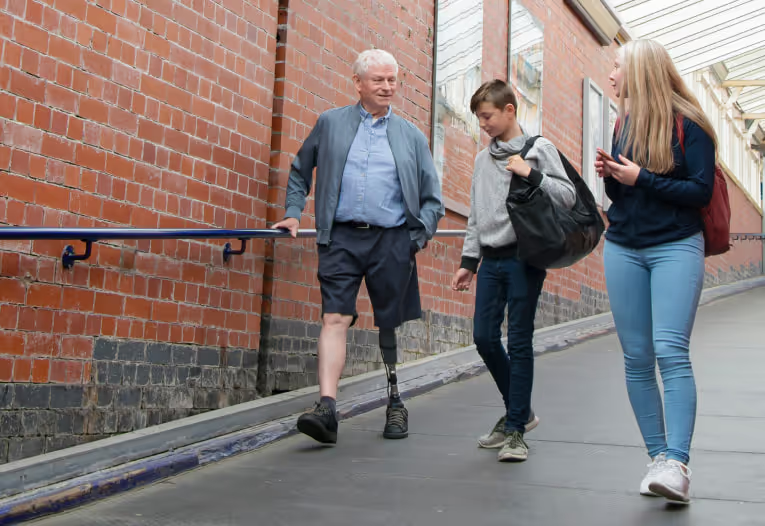Join our experts at PrimeCare as we dive into the world of K-Level prostheses. When it comes to living with limb loss and choosing the right prosthetic device, your mobility level plays a crucial role. Discover how K-Levels help prosthetists tailor prostheses to your specific needs and functional ability.
What Is a K-Level?

A K-Level, or Amputee Mobility Predictor, is a rating system that’s used to gauge an individual's rehabilitation potential for using a prosthetic device effectively. This rating ranges from 0 to 4 and reflects a person's ability to use a prosthesis if they have access to a suitable device and have completed the necessary rehabilitation to use it proficiently.
It was established in 1995 by Medicare to better assess the need and potential benefits of prosthetic devices for individuals who have undergone lower limb amputation. This classification system remains in use today, not only by Medicare but also by insurance companies and Medicaid, to determine eligibility for payment or reimbursement of funds related to prosthetics.
The dynamic aspect of K-Levels is that they can change as you continue to make progress and embrace new challenges. Your evolving K-Level may qualify you for different prosthetic components.
Why Is Medicare Concerned About Assessing My Rehabilitation Potential?
Medicare's concern lies in ensuring that the prosthetic devices they fund are put to effective use. They aim to avoid funding costly devices that remain unused in a closet due to unrealistic expectations or limitations. Conversely, they also strive to provide individuals with the potential to regain mobility and engage in community activities with devices that align with their needs and capabilities. In essence, Medicare aims to match prosthetic devices with each individual's unique requirements and potential.
How Many K-Levels Exist?
There are five K-Levels, each with its unique definition:

K-Level 0
Individuals in this category don’t have the ability or potential for ambulation or to transfer safely, even with assistance. The use of a prosthesis doesn’t enhance their quality of life or mobility.
K-Level 1
This level pertains to individuals who have the ability or potential to use a prosthesis for transfers or ambulation on level surfaces at a fixed cadence. It’s characteristic of limited and unlimited household ambulators.
K-Level 2
Those at K-Level 2 exhibit the ability or potential for ambulation and can navigate low-level environmental barriers, such as curbs, stairs, or uneven surfaces. This is typical of the limited community ambulator.
K-Level 3
Individuals at K-Level 3 have the ability or potential for ambulation with variable cadence. They’re considered community ambulators with the capacity to traverse most environmental barriers. They may also engage in vocational, therapeutic, or exercise activities that require prosthetic use beyond simple locomotion.
K-Level 4
At this level, individuals have the ability or potential for prosthetic ambulation that exceeds basic ambulation skills. They exhibit high impact, stress, or energy levels in their prosthetic demands and are often a child, active adult, or athlete.
How Are Prosthetics Tailored to Individual Amputee Patients?
In the Medicare system, claims for artificial limbs submitted by prosthetists are processed by the Durable Medical Equipment Medical Administrative Contractors (DME MAC). When Medicare has inquiries about a claim, they may ask for medical records to determine whether the prosthetic arm or leg wasn’t only reasonable but also deemed "medically necessary."
In this context, the prosthetist, acting as a supplier, relies on the patient's medical records to support their own documentation. It's crucial to highlight that payment justification hinges on the records maintained by the treating physician, rather than those of the prosthetist. This process takes into account the patient's functional ability level and their specific prosthetic requirements.
How Does the Physician Determine What Qualifies as Medically Necessary for Me?

This is a critical consideration because the determination of medical necessity for a prosthesis relies significantly on your functional capabilities. Many prosthetic components are specifically designed for certain functional levels which outlines the importance of your physician thoroughly documenting your functional capabilities both before and after amputation. Here’s what your physician's assessment typically encompasses:
- A history of your current condition(s) and pertinent medical history related to functional deficits.
- Evaluation of symptoms that limit ambulation or dexterity.
- Diagnosis of conditions contributing to these symptoms.
- Identification of any comorbidities impacting mobility or affecting the use of a new prosthesis.
- Assessment of the ambulatory assistance you currently rely on, such as a cane, walker, wheelchair, or caregiver.
- Description of how daily living activities are affected by these deficits.
- A physical examination is relevant to functional deficits, including musculoskeletal and neurological assessments.
- Measurements of weight, height, and any recent weight changes.
- Cardiopulmonary examination.
- Musculoskeletal examination, including evaluation of arm and leg strength and range of motion.
- Neurological examination that focuses on gait, balance, and coordination.
Based on this assessment, your physician will prescribe prosthetic components that align with your activity level as a K-Level amputee. It's essential to note that components designed for higher activity levels may not be covered under Medicare policy. Your functional ability level is determined by your physician, and if your functional ability increases over time, your rating can be adjusted to a higher level to accommodate exercise activity and evolving needs.
Unlocking Your Full Potential with PrimeCare
At PrimeCare, we believe in empowering you to achieve your highest potential, no matter your functional ability level. Our dedicated team specializes in crafting custom prosthetic and orthotic solutions that align with your unique needs and goals. From evaluating your functional capabilities to providing expert guidance, we're here to ensure you receive the prosthetic device that best suits you. Don't let limitations hold you back — take the next step toward a more fulfilling life with PrimeCare.
Contact us today to embark on your journey toward a customized prosthetic solution that enhances your mobility and quality of life.

.svg)
.svg)








